Estimated reading time: 13 minutes
Does your parakeet seem to be munching more than usual? Budgies eat a lot due to fast metabolism, but overeating can sometimes signal an underlying health or behavioral problem.
This in-depth article will unveil the main reasons for excessive eating in these vibrant birds and suggest practical strategies regarding proper feeding and healthcare.
Key Takeaways
- Parakeets eat a lot because they have a fast metabolism, so it’s normal for them to eat twice a day.
- Nutritional deficiencies can cause excessive eating in parakeets, so it’s important to feed them a balanced diet that includes fresh fruits and vegetables.
- Hormonal changes, such as during mating or pregnancy, can make parakeets eat more. It’s crucial to ensure they have a healthy diet during these times.
- Stress or boredom can affect parakeet eating habits. Providing mental and physical stimulation through toys and spending time with them can help regulate their appetite.
- Illness or disease can also cause excessive eating in parakeets. Monitor their health closely and consult an avian veterinarian if you notice any signs of illness or distress.
- Regularly check your parakeet’s weight, activity levels, droppings, and look for signs of illness to monitor their health effectively.
- Offer your parakeet a variety of fresh fruits and vegetables for a balanced diet. Balanced bird pellets should also be included but make up about 60% of their overall food intake.
Reasons Why Parakeets Overeat
Parakeets may eat excessively due to reasons such as a fast metabolism, nutritional deficiencies, hormonal changes, pregnancy or breeding behavior, stress or boredom, and illness or disease.
Fast metabolism
Parakeets need to eat a lot because they burn energy fast. Their bodies work hard all the time. This is due to their small size and double blood flow system. They use up more fuel than big birds, just like a small car uses up gas faster than a big truck.
So, your budgie is not being greedy — it’s just living life in the fast lane! Eating twice a day helps them keep going strong.
Nutritional deficiencies
Your parakeet might eat too much if it lacks certain nutrients. This can happen if the bird’s diet has too many seeds and not enough fresh foods. Seed-based diets are high in fat but low in key vitamins and minerals.
A lack of Vitamin A is one common problem for birds on seed diets, and it can make your bird sick.
To stop overeating due to nutritional needs, try to feed your budgie a balanced diet. A good mix includes fresh fruits, vegetables, and quality bird pellets. These food items are full of essential vitamins and minerals that will keep the little bird healthy.
Hormonal changes
Hormonal changes can make your parakeet eat more. These come from high levels of hormones like estrogen and testosterone. Mating, moulting, or jealousy can cause these spikes. Some budgies may face hormonal disorders too.
Avian diabetes mellitus is one such problem which makes the bird’s pancreas release too much insulin. This disorder will also push your bird to eat more than normal. More daylight can also stir up hormones in pet birds kept inside homes.
Female budgies that get stressed or show anger may be dealing with hormone issues as well.
Pregnancy or breeding behavior
Female parakeets may eat more when they are pregnant or going through breeding behavior. This is because their bodies require extra nutrients to support egg formation and the growth of baby birds.
Hormonal changes during this time can also cause changes in appetite and behavior. It’s important to ensure that your female parakeet has a balanced diet that includes additional calcium for egg production.
If you notice any unusual eating patterns or behaviors, it’s always a good idea to consult with an avian veterinarian to ensure the health and well-being of your bird.
Stress or boredom
Stress or boredom can affect your parakeet’s eating habits. Just like humans, birds can experience stress and become bored. This can lead to changes in their appetite and eating behavior.
If your parakeet is stressed or bored, they may eat less or more than usual. They might also show signs of restlessness, aggression, or destructive behavior. It’s important to provide mental and physical stimulation for your bird to prevent these issues.
Offering toys, providing a stimulating environment, and spending quality time with your parakeet can help alleviate stress and boredom so that they maintain a healthy eating routine.
Illness or disease
One possible reason for excessive eating and drinking in birds is illness or disease. Parakeets can be prone to various illnesses, such as AGY infection, parasites, and digestive issues caused by consuming certain foods in excess.
Symptoms of parakeet diseases may include lethargy, vomiting, loose droppings, and foul-smelling vomit. It’s crucial to monitor your bird’s health closely and seek veterinary care if you notice any signs of illness or distress.
Prompt treatment can help prevent further complications and ensure your parakeet stays healthy.
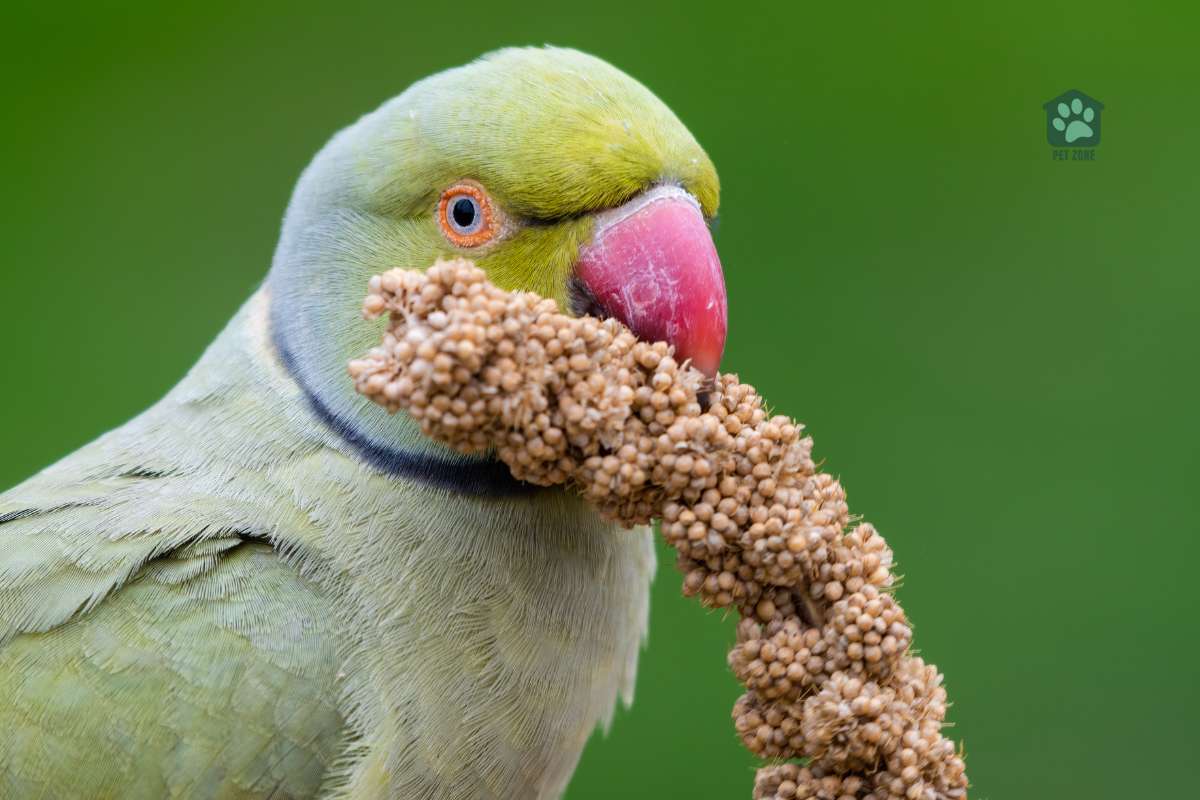
Assessing the Health and Behavior of Your Budgie
To assess your parakeet’s health and behavior, check for sudden weight loss, monitor activity levels, examine droppings, and look for signs of illness.
Checking for sudden weight loss
It’s important to keep an eye on your parakeet’s weight to ensure they are healthy. Here are some things to look for when checking for sudden weight loss:
- Weigh your parakeet regularly using a scale made specifically for birds.
- Monitor any significant changes in their weight, such as losing more than 10% of their usual body weight.
- Keep an eye out for physical changes, like a more prominent breastbone or a decrease in muscle mass.
- Watch for signs of decreased appetite or difficulty eating.
- Look for changes in behavior, such as lethargy or decreased activity levels.
Monitoring activity levels
Monitoring your parakeet’s activity levels is an important part of ensuring their overall health. Here are some ways you can keep track:
- Observe their movement: Pay attention to how active your parakeet is throughout the day. Are they flying, climbing, or hopping around their cage? These are signs of a healthy and active bird.
- Encourage exercise: Provide toys and perches that encourage physical activity. Swings, ladders, and ropes are great options for keeping your parakeet active and engaged.
- Watch for changes in behavior: If your parakeet suddenly becomes less active or shows signs of lethargy, it could be a sign of illness or discomfort. Monitor any changes in their behavior and consult a veterinarian if necessary.
- Allow out-of-cage time: Parakeets need daily exercise outside of their cages. Create a safe environment where they can fly and explore. Supervise them closely during these play sessions.
- Consider social interaction: Parakeets are social birds that thrive on companionship. Having another parakeet as a companion can provide mental stimulation and encourage more activity.
Examining droppings
Examining your parakeet’s droppings is an important way to assess its health and well-being. By regularly checking its droppings, you can gather valuable information about its eating habits, digestion, and overall health. Here are some things to look for when examining your parakeet’s droppings:
- Frequency: Healthy parakeets usually have several small droppings throughout the day.
- Amount: The size of the droppings should be consistent and not too large or too small.
- Smell: Normal droppings do not have a strong or unpleasant odor.
- Texture: Healthy droppings have a firm solid part (feces) surrounded by a white portion (urine).
- Color: Normally, the feces should be dark olive green or brown, while the urine portion should be white.
Checking for signs of illness
Signs of illness in your parakeet can be subtle, but it’s important to stay vigilant and watch for any changes. Here are some key signs to look out for:
- Fluffed-up appearance: If your parakeet appears constantly puffed up, it could indicate that they are feeling unwell.
- Changes in perching behavior: Notice if your parakeet is having difficulty perching or seems unsteady on its feet. This could be a sign of an underlying health issue.
- Dirty vent area: Keep an eye on your parakeet’s vent area, which is where their droppings come out. If the feathers in that region are dirty or caked with droppings, it may indicate a problem.
- Abnormal droppings: Pay attention to any changes in the color, consistency, or frequency of your parakeet’s droppings. Diarrhea or very watery droppings could be a sign of illness.
- Loss of appetite: If your parakeet suddenly stops eating or shows a significant decrease in appetite, it may be a red flag for an underlying health issue.
- Lack of energy: Observe if your parakeet is lethargic or less active than usual. A sudden decrease in energy levels could indicate illness.
How to Prevent Overeating and Obesity in Pet Birds
Provide a variety of fresh fruits and vegetables, offer balanced bird pellets, and limit high-fat and high-sugar treats to ensure your parakeet is eating properly with a well-balanced diet.
Providing a variety of fresh fruits and vegetables
To ensure a balanced diet for your parakeet, it’s important to offer a variety of fresh fruits and vegetables. These provide essential nutrients like carbohydrates and vitamins that are necessary for your pet’s health.
Including fresh foods in your parakeet’s diet adds variety and enjoyment to their meals. It also helps prevent physical health problems. Budgies need fresh food along with grains to get nutrients not found in their seed or pellet mix.
By providing a diverse range of foods, you can promote good health and prevent issues caused by a lack of fresh fruits and vegetables.
Offering balanced bird pellets
Balanced, pelleted food is an important part of your parakeet’s diet. They provide essential vitamins and minerals that your bird needs to stay healthy. Here are some tips for offering balanced bird pellets:
- Choose a high-quality pellet brand that is specifically formulated for small birds like parakeets.
- Offer your bird the pellets in a separate dish from other foods, such as fruits and vegetables.
- Start by offering a small amount of pellets and gradually increase the portion size over time.
- Make sure the pellets are fresh and not stale or moldy.
- Remove any uneaten pellets after a few hours to prevent them from becoming contaminated.
- Monitor your parakeet’s eating behavior to ensure they are consuming enough pellets.
- Consult with a veterinarian for specific recommendations on the amount and type of pellets to feed your parakeet.
Limiting high-fat and high-sugar treats
To help your parakeet maintain a healthy weight and avoid overeating, it’s important to limit high-fat and high-sugar treats. Here’s how you can do it:
- Avoid giving your parakeet overly fatty or sugary foods like chocolate, chips, or cookies.
- Instead, opt for healthier treat options such as small pieces of fresh fruit or vegetables.
- Make sure to offer these treats in moderation and as an occasional snack rather than a daily indulgence.
- Keep in mind that excessive consumption of high-fat and high-sugar treats can lead to obesity and other health problems in parakeets.
- Always consult with an avian veterinarian for advice on the best diet and treat options for your specific parakeet.
Providing mental and physical stimulation
Keeping your parakeet mentally and physically stimulated is crucial for their overall well-being. Here are some ways you can provide enrichment for your feathered friend:
- Offer a variety of toys: Provide toys that offer different textures, colors, and shapes. This can include bells, mirrors, ropes, and hanging toys. Rotate the toys regularly to keep your parakeet engaged.
- Provide foraging opportunities: Hide treats or food in different parts of the cage or in puzzle toys to encourage natural foraging behaviors. This stimulates their mental capabilities and keeps them entertained.
- Allow out-of-cage time: Give your parakeet supervised time outside of their cage to explore and fly around in a safe environment. This provides exercise and helps prevent boredom.
- Teach tricks or commands: Parakeets are intelligent birds that can be trained to perform simple tricks or respond to basic commands using positive reinforcement techniques. This engages their minds and strengthens the bond between you and your pet.
- Play interactive games: Engage in games like peek-a-boo or hide-and-seek with your parakeet. This interactive playtime strengthens the bond between you and provides mental stimulation.
When to Seek Veterinary Care
If your parakeet continues to excessively eat or shows sudden weight loss, changes in behavior or appearance, or any signs of illness or distress, it is important to seek veterinary care immediately.
Persistent excessive eating
If your parakeet is constantly eating and doesn’t seem to stop, it could be a sign of persistent excessive eating. This can be caused by various factors such as hormonal changes, stress or boredom, or even an underlying illness.
Parakeets have fast metabolisms and need to eat often, but if their eating becomes excessive and they are gaining weight rapidly, it’s important to monitor their health closely. Overeating in parrots can lead to obesity and health issues like fatty liver disease.
If you notice your parakeet persistently overeating, it’s best to consult with a veterinarian who specializes in avian care to rule out any potential health concerns and determine the appropriate course of action for your feathered friend.
Sudden weight loss
Sudden weight loss in parakeets can be a sign of digestive problems like papillomas in the gastrointestinal tract. These growths can cause symptoms such as vomiting, loss of appetite, and wasting.
It’s important to regularly weigh your bird to track any changes in weight and adjust their diet accordingly. Obesity is also a concern for birds, as it can lead to serious health issues like clogged arteries and liver disease.
If your budgie is eating well but still losing weight or showing other signs of illness, it’s best to seek veterinary care to ensure their health and well-being.
Changes in behavior or appearance
If you notice any changes in your parakeet’s behavior or appearance, it could be a sign that something is wrong. Birds can’t communicate like humans do, so we have to pay attention to their actions and appearance to understand what they might be going through.
If your parakeet starts acting differently than usual, such as being more quiet or inactive, it could indicate an illness or distress. Changes in appearance are also important to watch out for.
If you notice any abnormal feather loss, unusual droppings, or growths on your bird’s body, it may be wise to seek veterinary care right away. Remember, early detection of health issues can lead to better outcomes for your feathery friend.
Any signs of illness or distress
If your parakeet is showing any signs of illness or distress, it is important to take action. Look out for symptoms such as fluffed-up feathers, excessive squawking, or a visible decline in appetite and water intake.
These could be indications that your parakeet is not feeling well and may require immediate veterinary care. Remember that parakeets are known to hide their illnesses until they become too severe to conceal, so it’s crucial to pay attention to any changes in behavior or appearance.
If you notice anything unusual, don’t hesitate to seek professional help from an avian veterinarian who can provide the necessary medical assistance for your pet bird’s well-being.
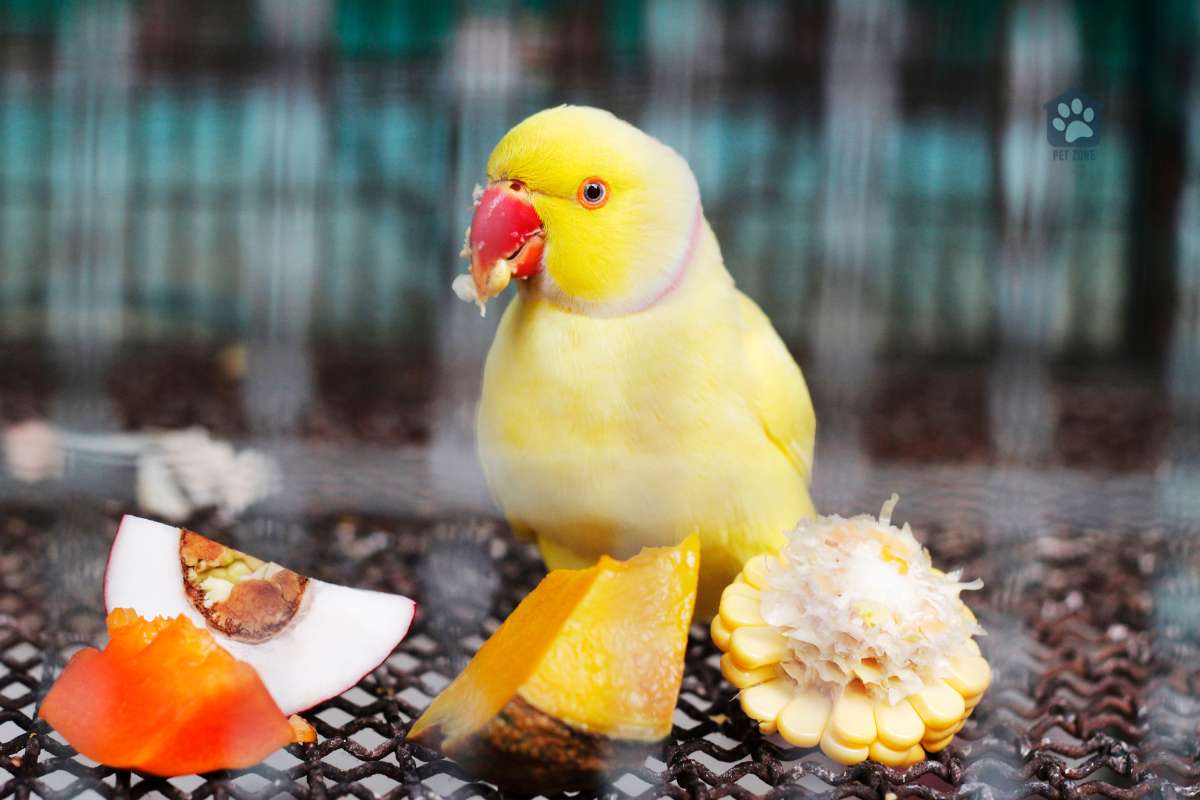
Conclusion
In conclusion, there are several reasons why your parakeet may be eating so much. It could be due to their fast metabolism, nutritional deficiencies, hormonal changes, stress or boredom, illness, or pregnancy/breeding behavior.
It’s important to monitor their health and behavior closely and provide a balanced diet to prevent overeating. If you notice any persistent excessive eating, sudden weight loss, or signs of illness or distress, it’s best to seek veterinary care for your pet bird.
Frequently Asked Questsions
Your budgie may be eating a lot because it likes the seed mix from the pet store or wants to nibble on fresh vegetables. But, this could also mean your bird does not know when to stop eating.
If your bird is healthy and active, you can offer 1-2 teaspoons of pellets every day with some vegetables and fruits. If your bird eats all this food, it’s a good sign that your budgie is getting enough food.
Yes! Birds like parakeets might start overeating if they don’t know when to stop as there is available food at all times which might even shorten their lifespan.
To prevent overeating, try removing the food after certain hours or reduce the amount of seed mixes for a better diet – add more pellets with nutritional value instead.
Look out for symptoms of illness such as abnormal beak growth or changes in how often they’re drinking water along with their usual eating habits. These could point towards issues related to overeating.
Yes! If you see no change even after altering diets and feeding methods, it’s best to consult a good avian vet who can check upon any underlying issues causing these problems.
As an Amazon Associate I earn from qualifying purchases.
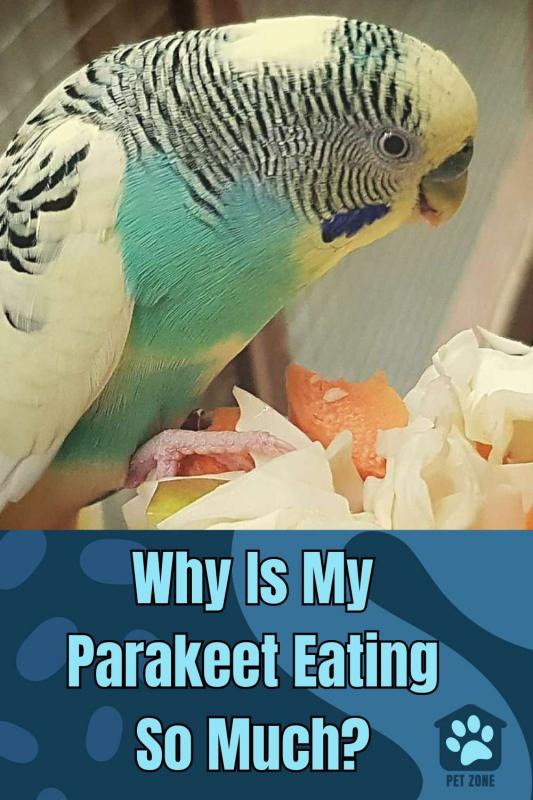


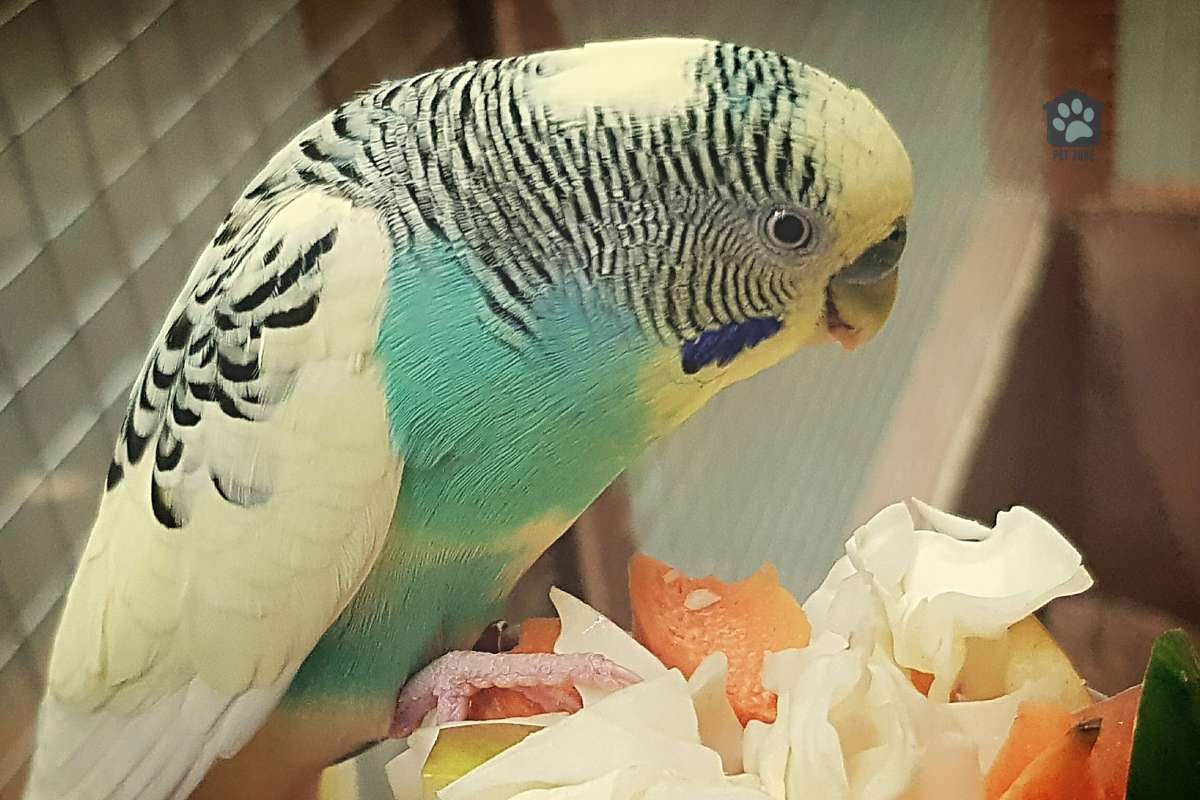
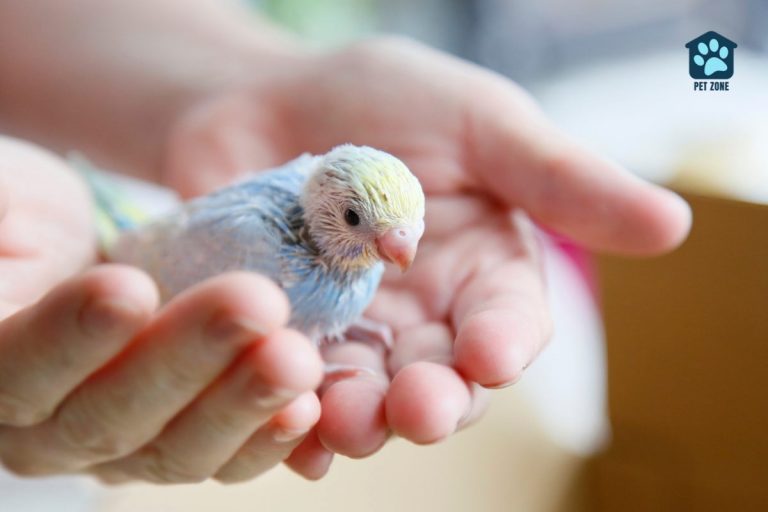
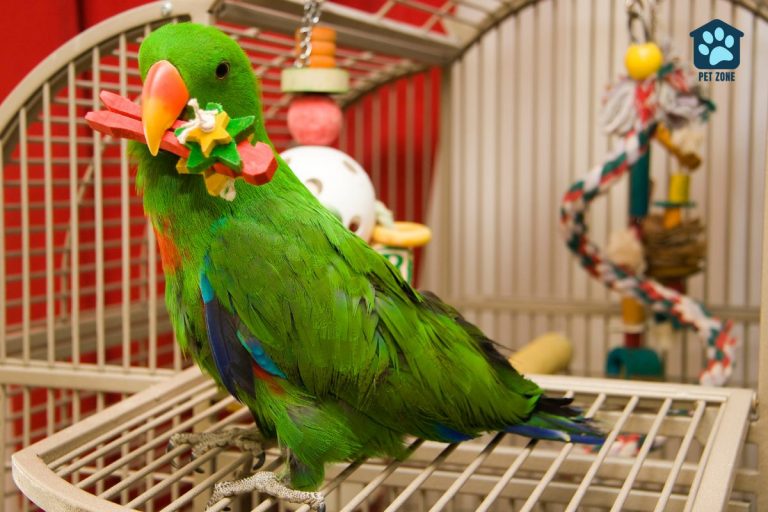
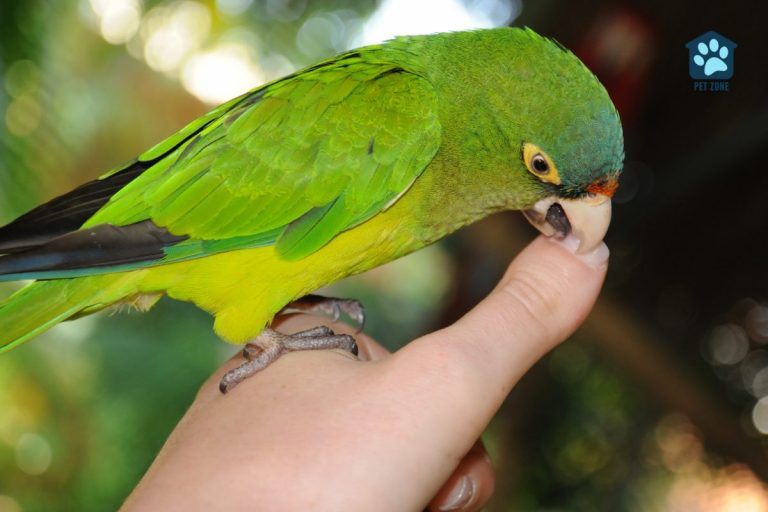
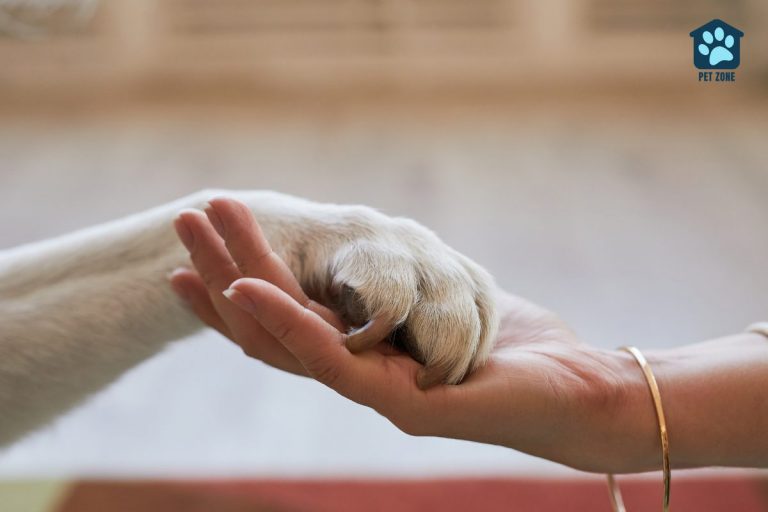
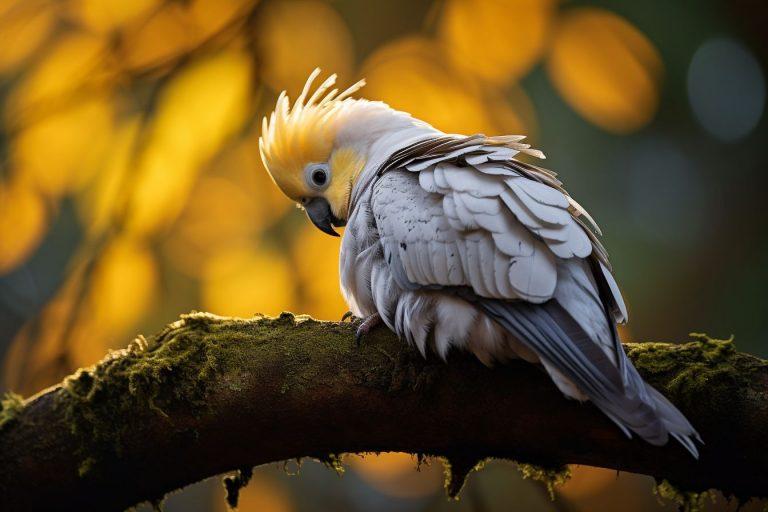
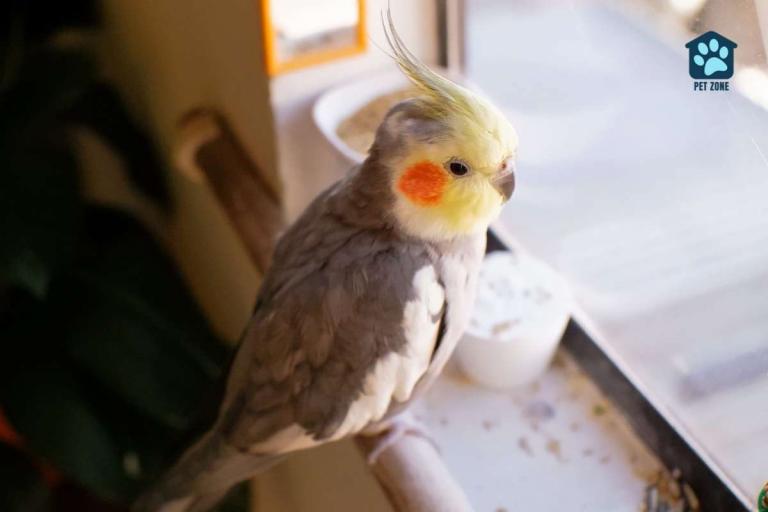
Interesting post. My mom had a pair of parakeets as pets. One died, we had to get another one. They were breeding like crazy. We later ended up with 12 paraqueets. We had to give some away. They definitely ate alot.